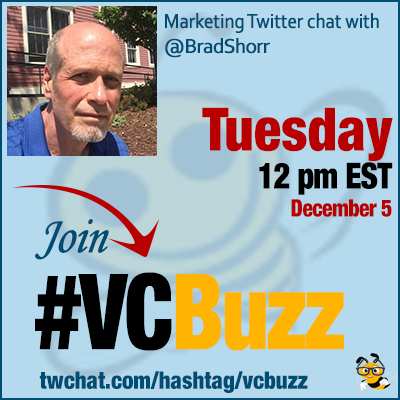 It all starts with keywords: They help you understand your niche better, come up with interesting topics to write on and, in the long run, generate more organic traffic for your website. But how to find the right keywords? Let’s discuss!
It all starts with keywords: They help you understand your niche better, come up with interesting topics to write on and, in the long run, generate more organic traffic for your website. But how to find the right keywords? Let’s discuss!
***Add #VCBuzz chats to your calendar here. ***Please sign in here to follow the chat -> twchat.com/hashtag/vcbuzz
About Brad
@BradShorr is director of content strategy at @StraightNorth
Connect to Brad on Linkedin
Questions we are going to discuss
Q1 How did you become a digital marketer? Please tell your career story!
I started in marketing before the Internet, and got into digital marketing at the beginning. Been doing copywriting forever, SEO since the early 00s
In 2005 when I started my copywriting biz, I felt I should have a specialty. So I learned SEO copywriting inside and out. Very complicated at that time
Worked in packaging 1980-2005. Freelance 2005-2010. Since then with StraightNorth, after they bought my company. Love it. Great agency.
Q2 Is keyword research still relevant these days? How has it evolved over the years?
Keyword research is totally relevant. You can’t do SEO without a keyword strategy. Picking the right keywords will make or break your SEO. Better research tools have evolved. More insight into competitiveness. However Google Analytics stopped providing organic keyword data, so now, there’s more guesswork involved. Hard to know which keywords are generating traffic. But I just stumbled on this may be a way to get at some of that organic keyword data.
Keyword research is more fluid today. You can’t stick with the same keyword targets for years on end. I think this is because competition moves faster, popular terms change faster, mobile & voice search opening up new, conversational keywords. Competition moves faster, popular terms change faster, mobile & voice search opening up new, conversational keywords.
High volume keywords reveal the language of the customer, which is helpful even if you’re not doing SEO at all
A2. I basically learned to follow the trends on social media because it is people who are chatting about a certain topic #vcbuzz
— Cheval John, Social Media Professional (@chevd80) December 5, 2017
A2. Keyword mastery is a shell game & it takes $ to win in many cases. It has gotten much more difficult to master IMHO. #vcbuzz
— Kristin Huntley (@seekristintweet) December 5, 2017
Q3 For a new business just starting to work on their digital content marketing, what are the tips on finding valuable keywords?
First, figure out what your SEO/PPC budget is. Then, you can decide to go after 1-2 big, competitive keywords, a bunch of longtail keywords, or a mix of the two.
Then, look at keyword options in terms of search volume, intent, competitiveness, relevance. Longtail terms need to have sufficient volume to bring in a critical mass of traffic and conversions
Look for terms with buying intent. “tuna fish’ shows no intent. “tuna fish recipes” shows research intent. “tuna fish on sale” shows buying intent. No point in driving a ton of traffic if none of the visitors want to buy anything.
Start with a small number of keywords and expand from there. The optimization you do to support your starter keywords will help build your domain authority and make further keywords easier.
A3 Keyword research is not just numbers and strings. Look at intent and seasonality. #vcbuzz
— Ann Smarty (@seosmarty) December 5, 2017
Q4 Let’s talk about keyword / topic clustering. What is it and how can it be applied to content marketing?
Clustering makes sense for on-site “evergreen content” – long-form, highly useful content that covers a high-level topic. Lots of related keywords will naturally fall in place. I think clustering is more applicable to content marketing than SEO, at least on-site SEO
Look for terms with buying intent. “tuna fish’ shows no intent. “tuna fish recipes” shows research intent. “tuna fish on sale” shows buying intent.
Important: Clustering is also good for off-site content, both for SEO and content marketing in general. Off-site SEO content is much more about link building than keyword optimization.
Off-site content, for SEO, is about getting good links. You want your own site’s content showing up in SERPs for your main keywords, not content on somebody else’s site.
Clustering keywords for off-site content is great – it makes for more broadly appealing content. Publishers like that.
For SEO, keywords matter MOST for your site’s HOME page and target PRODUCT/SERVICE pages. That’s where conversions happen.
This case study I recently published may help re: content marketing, tho not specifically about keywords
A4 Basically, keyword clustering is nothing new; it’s just SEO industry loves buzz words. It’s simply understanding your keywords better by organizing them into groups and understanding underlying concepts #vcbuzz
— Ann Smarty (@seosmarty) December 5, 2017
A4. I honestly believe if you put out quality content consistently, your seo will rise to the ranks and the keywords will take care of itself #vcbuzz
— Cheval John, Social Media Professional (@chevd80) December 5, 2017
Q5 What are your favorite keyword research tools? How to evaluate keyword competition and find less competitive keywords?
- If you are using AdWords, Google Keyword Planner is great – obviously Google data is reliable
- In my freelance days, I used WordStream and loved it
- The Yoast SEO plugin for WordPress is also great, and highly rated by the WP community.
A5 DO play with these three: @Semrush @Ahrefs and @serpstat LOADS of great filters, data and options #vcbuzz
— Ann Smarty (@seosmarty) December 5, 2017
I like @BuzzSumo for content, and the @redevo tool #seedkeywords, @longtailpro @SEMRush and #soolve is a free tool. #vcbuzz
— Kristin Huntley (@seekristintweet) December 5, 2017
Keyword Researcher Pro is the cat's meow for SEO. #vcbuzz
— Don Sturgill (@DonSturgill) December 5, 2017
Also like @hittail …I know Google Adwords planner is supposed to be helpful…but I have not found it to be so much. #vcbuzz
— Kristin Huntley (@seekristintweet) December 5, 2017
Market Samurai is a bit more involved, but a huge SEO eye-opener. #vcbuzz
— Don Sturgill (@DonSturgill) December 5, 2017
But the SEO method outlined here trumps them all: https://t.co/aKuVOk273i … not self-promoting, just saying. #vcbuzz
— Don Sturgill (@DonSturgill) December 5, 2017
Bottom line: These days you need to use ALL KINDS of sources you can get your hands on: Keyword research tools, customer surveys, social media listening, etc. #vcbuzz
— Viral Content Bee (@vcbuzz) December 5, 2017
Our previous search engine optimization chats:
- Essential Steps of an SEO Audit with @MattLacuesta #VCBuzz
- How to Optimize My Content #VCBuzz
- How to Understand Your Customers’ Content Needs with @PamDidner #VCBuzz
- How to Create Content Marketing Interviews with Tara M. Clapper @irishtara #VCBuzz
- SEO Coaching and Findability Principles with Heather Lutze @HeatherLutze #VCBuzz




Leave a Reply